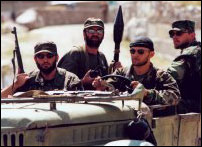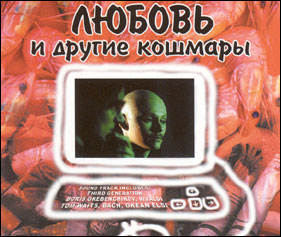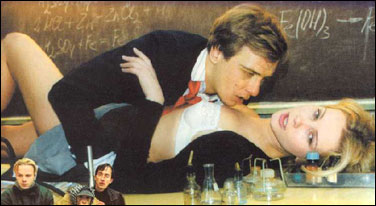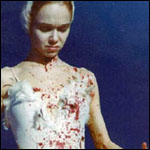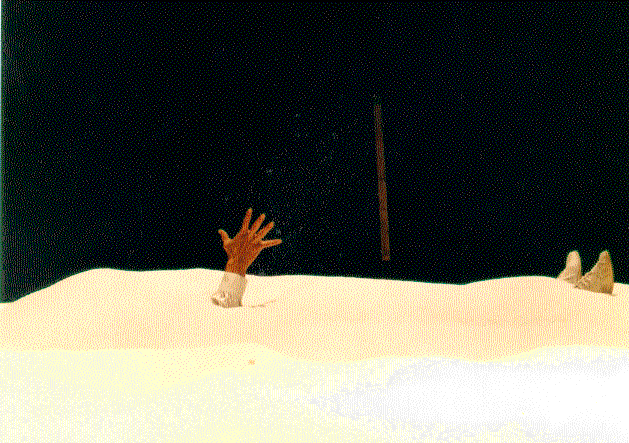Category: ARTMargins Online: New Media & Film
From Sochi to Moscow: DEBUTS, DEBUTS, DEBUTS…
“WAR”, Dir. by Alexei Balabanov (Russia, 2002)
The politically correct European has for a long time already considered Alexei Balabanov an out-and-out nationalist. The liberal public opinion in Russia is in agreement with this definition.
Both here and there the director of the film “War” is reproached with presenting only the Russian point of view on the conflict in Chechnya in the film. In the meantime, both there and here, the genre of the film is ignored for some reason.
Alexey Balabanov made “War” as a classical Western. The young Caucasian captive returns to Chechnya to rescue the bride (Ingeborga Dapkunaite) of the British fellow sufferer (Ian … Read more
LOOKING FOR IDENTITY: POLISH CINEMA OF THE NINETIES
Polish cinema had to face a shift in the early nineties. Its goal was no longer to fight the system and express the doubts and fears of an individual living in totalitarian society. The “code” used in many popular and artistic Polish films made in the eighties and earlier had become useless.
Films such as “Seksmisja” by Juliusz Machulski (Sex Mission, 1984) or “Rejs” by Marek Piwowski (The Boat Trip, 1970) listed among Polish cult favourites, could no longer satisfy the needs of the nineties’ audience. Some directors noticed the need for change. Film – both in its popular and
The Czech Cinema After the “Velvet Revolution” (1990-2000)
In the last decade, after the so-called “Velvet Revolution” of 1989 in which the totalitarian regime in the country collapsed and was replaced by a democracy, Czech cinema has undergone a number of developments.
First, let us look at the general state of film production during the ’90s. I should say that, when selecting the films to be discussed in this article, I grew intensely skeptical because of the blandness and mediocrity of most of the Czech film production in the past decade. Was there anything of universal interest, something that transcended the merely local, if not provincial dimension?
I
“Khrustalev, My Car!”, Dir. Alexei German (Russia, 1998) and “Taurus”, Dir. Alexander Sokurov (Russia, 2000)
Recent Russian films on historical themes have been concerned above all with the end of things. For instance, Gleb Panfilov’s The Romanovs: Crown-Bearing Family (2000) looked at the Russian royal family’s final years, culminating in their massacre in 1918, and suggests that those really responsible for their demise were not the Bolsheviks (mere blunt instruments of history), but the royal generals,disillusioned with the Tsar because of his increasing reluctance to prosecute an unwinnable war. German and Sokurov also revisit the past, but without the agenda Panfilov espouses (rehabilitation of the royal family as martyrs for Holy Russia). Rather, these are … Read more
Love and Other Nightmares [Ljubov’ i drugie kosmary]. Dir. Andrej Nekrasov (Russia, 2001)
Apart from the pun in the title (in Russian lyubov means love, but it’s also a woman’s name), some will admire the mega metafilmic framework of this film, while others may be irritated by its contortions.
The metafilm collides with a sci-fi plot. Alex, the only male character, is conducting an experiment in videoed dream-projection. He is consistently behind the camera: a modern entrepreneur in New Russia who speaks English with a Russian accent, he sets out to recruit women to dream about.
Women provide the material of both Alex’s experiment and the film itself, from the Western nightclub girl … Read more
“Tender Age”, Dir. by Sergei Soloviev (Russia, 2001)
Tender Age was produced by TriTe, Nikita Mikhalkov’s film production outfit. The script was written by Sergei Soloviev and his son Dmitri Soloviev, who also plays the main part in the film.
The film is, as most of Soloviev’s recent film, subdivided into episodes, which in turn have numerous intertitles that ironically reflect on the storyline. Here, the three parts are entitled: Idiot, Fathers and Sons, and War and Peace.
The film explores the fate of a generation of the children from families of with and elite status (party workers, foreign office civil servants, etc.) at … Read more
Editorial: Letter From Moscow
The high season of film festivals is over for the year 2001, and after a long ‘low’ of international starts at Russian film festivals, the Moscow Film Festival (June 2001) could boast with the presence of Jack Nicholson, while the Sochi International Film Festival (June 2001) presented Jean-Claude van Damme and Ornella Muti.
The fate of Russian films at international festivals, however, leaves much to be desired: there was no Russian entry in the Moscow Film Festival, and none in the main competition in Venice (September 2001). Sergei Bodrov’s (sr) The Quickie, made in the US, was shown in
Moving Pictures
Galerie Behemot – June 15th – July 7th, 2001
One process that is peculiar to cinema is that of generating the impression of movement. Much like a still camera, a movie camera can only take one picture at a time, and the same is true with a projector, which can only show one frame at a time.
The film moves intermittently, driven and stopped by the sprockets, which in turn are driven by a crank or a motor. A motor and a camera are also just a few of the components that drove Veronika Drahotova to create … Read more
Late Night Talks With Mother: New Films from the Karlovy Vary and Plzen Film Festivals
Late Night Talks with Mother (Nocni hovory s matkou). Dir. Jan Nemec (Czech Republic, 2000)
This new film from Czech director Jan Nemec has proved a surprise success at a number of festivals, including Plzen, Karlovy Vary, and Locarno, where it won the main award in the competition for video. It is now scheduled for London, Mannheim, and Rotterdam. Nemec directed such key 60s films as Diamonds of the Night (Demanty noci), The Party and the Guests (O slavnosti a hostech), and Martyrs of Love (Mucednici lasky). He subsequently filmed the Soviet … Read more
Dmitri Meskhiev’s “Mechanical Suite”
Dmitri Meskhiev’s work over the last years has been quite uneven: from the experimental work in his adaptation of Mariengof’s Cynics (1991), his poetic exploration of loneliness in Over Dark Waters (1993) and his short film in Arrival of a Train, entitled “Exercise No. 5” (1995), he chose to move on to more commercial projects. In 1998 he released two films: A Women’s Property, produced by the company “Slovo” (in a project that intended to encourage young directors to work on commercially viable projects rather than indulge in experiments that would never reach an audience, as had partly … Read more
“Moscow”. Dir. Alexander Zeldovich (2000)
The script “Moscow” by the well-known prose writer and conceptualist Vladimir Sorokin (written jointly with A. Zeldovich) explored the emergence of a new language of power, a discourse of the “new Russians” from the splinters of the Soviet monolith and from recollections about totalitarian culture.
According to the script this discourse of a new totalitarianism (that emerged, it seems, on the basis of free enterprise!) has literally been formed in front of our eyes, has absorbed the most colourful characters (Mike, Mark), and has opened the path for a non-entity that covers its facelessness with a multiplicity of faces (Lev).… Read more
Kira Muratova’s “Minor People”
Muratova’s latest film explores the theme of death: in the first scene of the film, we see a doctor attending to a critically ill patient. The reaction of the dying man’s wife sets the tone for Muratova’s approach to text, which functions as a musical accompaniment rather than a conveyor of meaning. The wife reads to the doctor the definition of the terms ‘coma’ and ‘agony’ (his diagnosis) from an encyclopaedia. The doctor hardly needs a reminder of the meaning of medical terms, nor does the wife … Read more
Theater as Simulation, or the Virtual Overcoat: Towards a Theater of the Postmodern
For over an entire century theater has existed as make-believe, as it has tried to create the illusion of reality on stage by developing the notion of empathy in order to stimulate the spectator emotionally. For over three quarters of a century this conventional, realistic theater has coexisted with a “theater as theater” that opposes these principles and seeks instead to push the spectator towards a rational response to the stage events, to make him aware of the spectacle, and to use its effects and attractions to enhance theatricality.
Cultural history, be it in theater, cinema, architecture or the … Read more
From Sochi to Moscow: Last Season’s Film Festivals in Russia
After his election to the Chairman of the Filmmakers’ Union in 1998, Mikhalkov immediately announced his plans to make the Moscow International Film Festival (whose chairman he became automatically with his election) an annual event. Since its first regular run in 1959 (there had been one film festival under Stalin in 1935) MIFF had been a biannual event, held in uneven years (with their notoriously hot summers). The first MIFF held under Mikhalkov’s in 1999 was opened by the then Prime Minister Stepashin, who officially confirmed at the opening ceremony what had been sought after by Mikhalkov: the festival would … Read more
The Wit and Grace of Jiri Menzel
If asked to name one Czech film, an American film buff will mostly likely mention Jiri Menzel’s Oscar winning “Closely Watched Trains” (1966). But Menzel has directed 15 feature films, several of which are just as wonderful, if not better. The Menzel film retrospective, which began in New York City last October, is continuing its tour across the country and represents a rare and fantastic opportunity to see some of his other work, including: “Capricious Summer” (Rozmarneleto, 1967); “Larks on a String” (Skrivanci na niti, 1969); “Cutting it Short”(Postriziny, 1980); “Festival of Snowdrops” (Slavnosti snezenek, 1983); “My Sweet Little Village” … Read more
Two Recent Hungarian Films
Tükrözõdések (Mirrorings) – Directed by Istvan Darday and Gyorgyi Szalai. 1998.
Presszo (Espresso) – Directed by Tamas Sas; written by Gabor Nemeth. 1998.
Tükrözõdések is an ambitious and complex experimental film by Istvan Darday and Gyorgyi Szalai. A dense pictorial compilation of the oblique memories and imageries from a dying scientist’s (Teo Fabricius) life. The scientist, suffering from the near fatal injuries of a car crash as well as an unidentified terminal Œailment’ incurred during his work in Chernobyl, has his life threatened by a doctor/Mafioso for some knowledge he possesses about the nuclear disaster. This bizarre film blurs the … Read more

